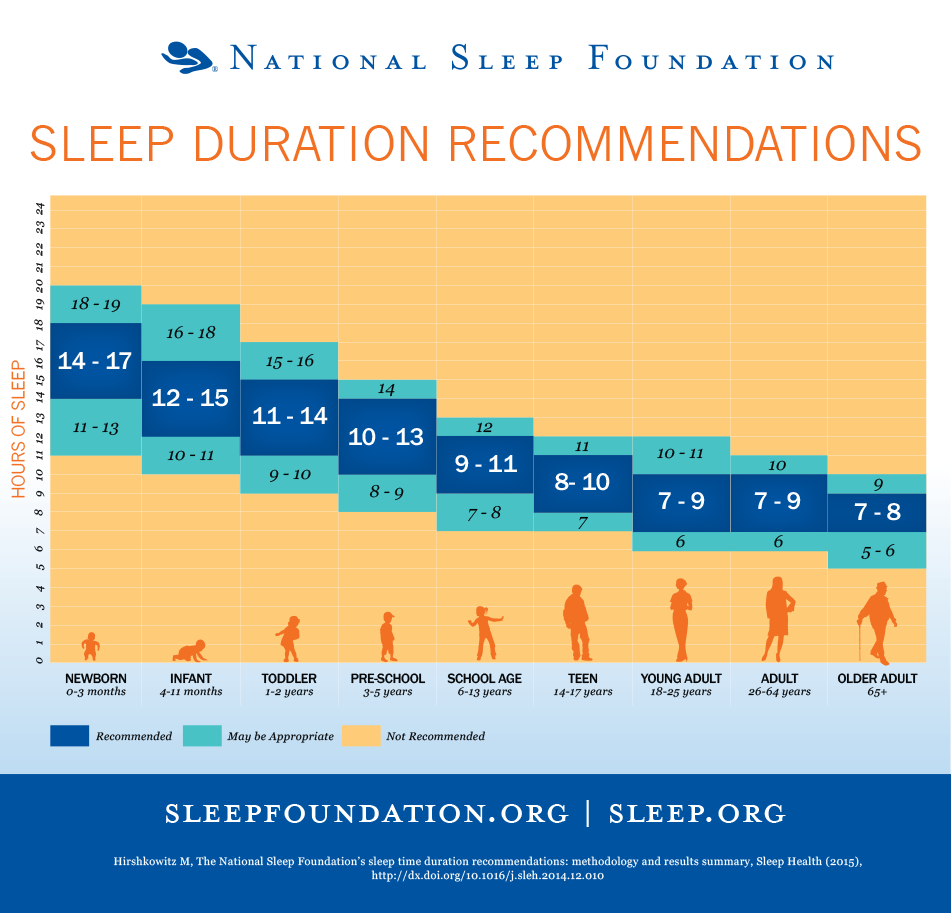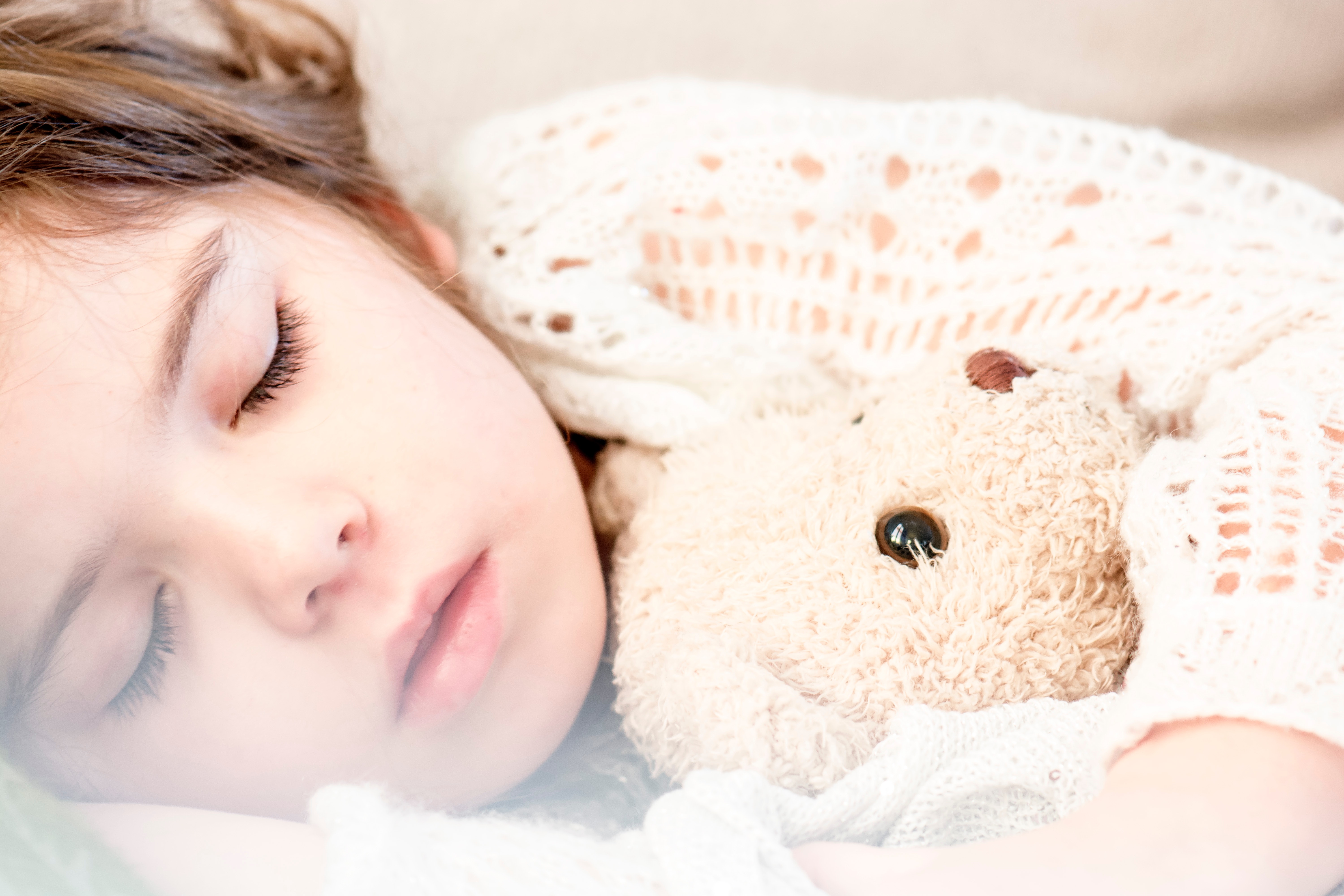Cough and colds, school anxiety, and the monster under the bed have made many aware of the value of uninterrupted sleep. It’s a fact that our health, happiness, and at the very least, our sanity, is directly dependent on sleep.
So for children who play until they collapse and wake early for school, how can we determine how many hours of sleep they really need? In 2015, The National Sleep Foundation, with a multi-disciplinary panel of specialists, issued its new recommendations for appropriate sleep durations. This may answer the bulk of your questions if your children are older. For children under 4, the listed range is the total for day and night. I therefore included a bar graph with the averages for day versus night sleep durations for young children. Additionally, in this handout, I provide some sleep tips for various ages and summarize literature on the psychological outcomes of sleep training.

Newborns (0-3 mos)
Newborns sleep 10 to 20 hours a day with intermittent wakefulness of 1-3 hours. Their sleep-wake cycle correlates with the need to be fed, changed and nurtured. They do not discriminate day versus night and their sleep period may last a few minutes to several hours. Movements such as twitching, smiling, and sucking are common.
Fussiness, crying, and eye rubbing are often sleep signals. To sleep train your newborn, you can put her to bed when she is sleepy, but not asleep. This allows her to self soothe for sleep. By the end of the first month you can increase awake time during the day by playing with her and exposing her to light and noise. As evening approaches, try to create a quiet, dim environment with less activity.
Pearls for Newborn Sleep
- Observe baby’s sleep patterns and identify baby’s specific signs of sleepiness.
- Put baby in the crib when drowsy, not asleep.
- Place baby on her back with face and head clear of any soft items.
- Encourage nighttime sleep by interacting during the day as she approaches 2 months.
Infants (4-11 months)
By six months of age, nighttime feedings are often not necessary and many infants sleep through the night; 70-80 percent will do so by nine months of age. Infants typically sleep 9-12 hours during the night and take 30 minute – 2 hour naps, one to four times a day. The naps are fewer as they reach one year of age.
When infants are put to bed drowsy but not asleep, they are more likely to become “self- soothers” which enables them to fall asleep independently at bedtime and put themselves back to sleep during the night. Those who have become accustomed to parental assistance at bedtime often become “signalers” and cry for their parents to help them return to sleep. Sleep training is one of the hardest transitions for parents who have returned to work. Separation during the day often leads to increased parental attention at night. Parents who coddle their child back to sleep can sleep train their child at a later stage but usually this requires more discipline and time. Sleep training is a personal decision as there is no long-term effect on the child in either scenario. For the caregiver, there is concern for fatigue, and sometimes depression. In my experience, parents are successful at sleep training when both parents are completely ready. When I hear a parent question the value of sleep training, I recommend waiting. Both parents should be in agreement, pick a specific date to start sleep training and be aware that the child will need approximately one week to adjust to self soothing as a means to fall asleep. Reasons to delay sleep training may include illness, as well as social and developmental changes (e.g. recent onset of separation anxiety or a spurt in motor development).
For a good book on sleep training, try “On Becoming Baby Wise: Giving Your Infant the Gift of Nighttime.”
Pearls for Infant Sleep
- You need to believe in the value of sleep training in order to succeed.
- Plan for an entire week of sleep training.
- Do not try to sleep train during a difficult period (illness, a parent away for travel, etc.).
- Talk to your pediatrician or find a local sleep trainer if you are running into problems.
Toddlers (1-2 years)
Toddlers need about 11-15 hours of sleep in a 24-hour period. When they reach about 18 months of age, naptimes will decrease to once a day lasting about one to three hours. Naps should not occur too close to bedtime as they may delay sleep at night.
Many toddlers resist going to bed and/or awake with nighttime terrors or nightmares. This stage for sleep training is very difficult due to separation anxiety and an increase in motor, cognitive and social abilities. Daytime sleepiness and behavior problems may signal poor sleep or a sleep problem. Also if your child is mouth breathing or snoring they may not be getting the sleep he or she needs.
Pearls for Toddler Sleep
- Set a distinct bedtime regimen with tooth brushing, books, and quiet time.
- Assure yourself and the crying infant that they are “OK” if crying goes on for more than 15 minutes if not sooner.
- Inform your pediatrician if there is consistent snoring and/or daytime sleepiness outside of nap time.
Preschoolers and Sleep
Preschoolers typically sleep 11-13 hours each night and most do not nap after five. As with toddlers, difficulty falling asleep and waking up during the night are common. With further development of imagination, preschoolers commonly experience nighttime fears and nightmares. In addition, sleepwalking and sleep terrors peak during preschool years.
Sleep Tips for Preschoolers
- Maintain a regular and consistent sleep schedule.
- Have a relaxing bedtime routine that ends in the room where the child sleeps.
- Child should sleep in the same sleeping environment every night, in a room that is cool, quiet and dark – and without a TV.
Sleep and School-aged Children (6-13 years)
Children 6 to 13 need 9-11 hours of sleep. During this stage there is an increasing demand on their time from school (e.g., homework), sports and other extracurricular and social activities. In addition, school-aged children become more interested in TV, computers, the media and Internet as well as caffeine products – all of which can lead to difficulty falling asleep, nightmares and disruptions to their sleep. In particular, watching TV close to bedtime has been associated with bedtime resistance, difficulty falling asleep, anxiety around sleep and sleeping fewer hours. Sleep problems and disorders are prevalent at this age. Poor or inadequate sleep can lead to mood swings, behavioral problems such as ADHD and cognitive problems that impact on their ability to learn in school.
Sleep Tips for School-aged Children
- Teach school-aged children about healthy sleep habits.
- Continue to emphasize need for regular and consistent sleep schedule and bedtime routine.
- Make child’s bedroom conducive to sleep – dark, cool and quiet.
- Keep TV and computers out of the bedroom.
- Avoid caffeine.
References: National Sleep Foundation



